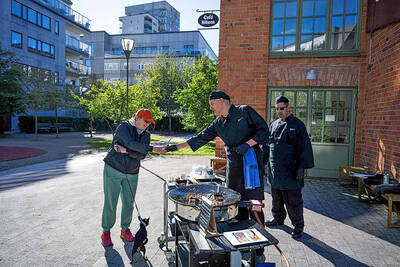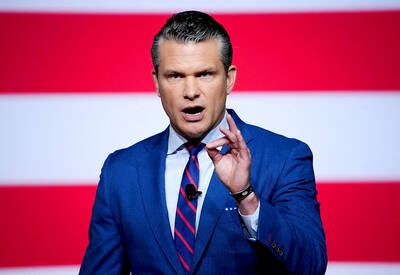The Iranian leadership boasts it is safe from US military action, saying Washington knows an attack would find no world support and send oil prices skyrocketing. That confidence is buoying the government in its standoff with the West, despite new sanctions.
Iran's top nuclear negotiator, Saeed Jalili, on Friday dismissed the US announcement a day earlier of new sanctions, saying "Washington will isolate itself" with the measures.
"They have imposed sanctions on us for 28 years. The new sanctions are just in the same direction," Jalili said as he returned from talks with European officials in Germany and Italy, the state news agency IRNA reported.
Iranian President Mahmoud Ahmadinejad has taken a hard line in the confrontation with the West over its nuclear program, apparently confident Washington's main pressure tools -- sanctions and the threat of military action -- are ineffective.
It could be a risky bet. Ahmadinejad's main vulnerability is domestic: rising criticism from a public angry over the country's poor economy and from politicians disillusioned by what they call his mismanagement. Even some conservatives have expressed fears Ahmadinejad is pushing Iran into future trouble over the nuclear issue.
Further sanctions, even unilateral ones from the US, could hurt the economy more by further isolating it from international finance -- and Iranians have already been expressing worries over the new measures.
Ahmadinejad, who faces elections in 2009, knows "jobless and poor people will not vote for him if his policies bring them more difficulties," said Ahmad Bakhshayesh, a political science professor at Tehran's Azad University.
But he believes "unilateral economic sanctions by Washington are not strong enough [to hurt Iran] due to Iran's widespread economic relations with the world."
Suzanne Maloney, a specialist on Iran at the Washington-based Brookings Institution, said that while sanctions have put pressure on the regime, oil prices have dampened their effect.
"Yes, life becomes more expensive, but right now they have a fairly considerable cushion," she said, adding that sanctions might force the government to become more fiscally responsible.
"A flush Iran has been an irresponsible Iran," she said. "Most of their economic problems have been caused by having too much cash on their hands."
In the face of new sanctions, "it's not unthinkable that they'll take more responsible measures at home that will cut some of the internal pressure."
Recent US statements have deepened Iranians' fears of attack. Last week, US President George W. Bush warned that a nuclear Iran could lead to "World War III," and Vice President Dick Cheney vowed on Sunday that the US and other countries would not allow Iran to obtain a nuclear weapon. Iran denies it is seeking nuclear weapons, saying its program aims only to produce electricity.
After the US sanctions announcement, a string of Iranian military officials came forward to insist the US will not attack Iran, citing the strain on the US military from the Iraq war and worries over high oil prices. But they vowed harsh reaction if the US does attack.

READINESS: According to a survey of 2,000 people, 86 percent of Swedes believe the country is worth defending in the event of a military attack Swedes are stocking up on food items in case of war, as more conflict in Europe no longer feels like a distant possibility, and authorities encourage measures to boost readiness. At a civil preparedness fair in southwest Stockholm, 71-year-old Sirkka Petrykowska said that she is taking the prospect of hostilities seriously and preparing as much as she can. “I have bought a camping stove. I have taken a course on preservation in an old-fashioned way, where you can preserve vegetables, meat and fruit that lasts for 30 years without a refrigerator,” Petrykowska said. “I’ve set aside blankets for warmth, I

FRUSTRATIONS: One in seven youths in China and Indonesia are unemployed, and many in the region are stuck in low-productivity jobs, the World Bank said Young people across Asia are struggling to find good jobs, with many stuck in low-productivity work that the World Bank said could strain social stability as frustrations fuel a global wave of youth-led protests. The bank highlighted a persistent gap between younger and more experienced workers across several Asian economies in a regional economic update released yesterday, noting that one in seven young people in China and Indonesia are unemployed. The share of people now vulnerable to falling into poverty is now larger than the middle class in most countries, it said. “The employment rate is generally high, but the young struggle to

ENERGY SHIFT: A report by Ember suggests it is possible for the world to wean off polluting sources of power, such as coal and gas, even as demand for electricity surges Worldwide solar and wind power generation has outpaced electricity demand this year, and for the first time on record, renewable energies combined generated more power than coal, a new analysis said. Global solar generation grew by a record 31 percent in the first half of the year, while wind generation grew 7.7 percent, according to the report by the energy think tank Ember, which was released after midnight yesterday. Solar and wind generation combined grew by more than 400 terawatt hours, which was more than the increase in overall global demand during the same period, it said. The findings suggest it is

‘ARMED CONFLICT’: At least 21 people have died in such US attacks, while experts say the summary killings are illegal even if they target confirmed narcotics traffickers US forces on Friday carried out a strike on an alleged drug-smuggling boat off the coast of Venezuela, killing four people, US Secretary of Defense Pete Hegseth said. The latest strike, which Hegseth announced in a post on X, brings the number of such US attacks to at least four, leaving at least 21 people dead. An accompanying video shared by Hegseth showed a boat speeding across the waves before being engulfed in smoke and flames. “Four male narco-terrorists aboard the vessel were killed,” the Pentagon chief wrote. He said the strike “was conducted in international waters just off the